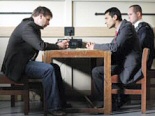 The APS Observer magazine has a fantastic article on the power of false confessions to warp our perception of other evidence in a criminal case to the point where expert witnesses will change their judgements of unrelated evidence to make it fit the false admission of guilt.
The APS Observer magazine has a fantastic article on the power of false confessions to warp our perception of other evidence in a criminal case to the point where expert witnesses will change their judgements of unrelated evidence to make it fit the false admission of guilt.
We tend to think that no-one would confess to a crime that they didn’t commit but there are numerous high profile cases where this has happened and the article notes that “because of advances in DNA evidence, the Innocence Project has been able to exonerate more than 200 people who had been wrongly convicted, 49 of whom had confessed to the crime we now know they didn’t commit.”
As a result of some of the early discoveries of false confessions, there is now a growing amount of research on what personal and situational factors trigger false confessions.
The classic book on the topic is forensic psychologist Gisli Gudjonsson’s The Psychology Of Interrogations And Confessions. It reviews the scientific evidence but also covers numerous legal cases where false confessions have played a part.
It turns out, people falsely confess to crimes for a wide array of reasons. Some are voluntary confessions where the person might want to gain notoriety, annoy the police or might genuinely believe they’ve committed the crime due to a delusion in the context of a psychotic mental illness like schizophrenia.
In other cases, a false confession can be triggered by pressure from the police or investigators. Sometimes this happens even when the person doesn’t genuinely believe their confession, because they just want to escape the high-pressure situation. In other cases, the psychological pressure leads the person to start doubting their own memories and they come to believe they have committed the crime.
There is now a great deal of research showing that highly suggestible people and people with learning disabilities or mental illnes are much more likely to make a false confession under pressure and police interview guidelines are being changed as a result.
However, the APS article takes a different tack. It looks at the psychology of how other people involved in deciding whether the person is guilty or not are influenced by confessions.
Imagine if an accused but innocent person falsely confesses and the other evidence doesn’t suggest that they have committed the crime. In this situation, it turns out that both lay people and experts tend to change their evaluation of the other evidence and perceive it as being stronger evidence against the accused.
Some of the studies cited in the article just blew me away:
In a 1997 study, Kassin and colleague Katherine Neumann gave subjects case files with weak circumstantial evidence plus either a confession, an eyewitness account, a character witness, or no other evidence. Across the board, prospective jurors were more likely to vote guilty if a confession was included in the trial, even when they were told that the defendant was incoherent at the time of the confession and immediately recanted what he said… Other studies have shown that conviction rates rise even when jurors see confessions as coerced and even when they say that the confession played no role in their judgment…
Kassin recently teamed up with psychologist Lisa Hasel to test the effect of confessions on eyewitnesses. They brought subjects in for what was supposed to be a study about persuasion techniques. The experimenter briefly left the room and, during that time, someone came in and stole a laptop off the desk. The subjects were then shown a lineup of six suspects, none of whom was the actual criminal, and they were asked to pick out which member of the lineup, if any, committed the crime. Two days later, the witnesses were brought back for more questioning… Of the people who had identified a subject from the original lineup, 60 percent changed their identification when told that someone else had confessed. Plus, 44 percent of the people who originally determined that none of the suspects in the lineup committed the crime changed their mind when told that someone had confessed (and 50 percent changed when told that a specific person had confessed). When asked about their decision, ‚Äúabout half of the people seemed to say, “Well, the investigator told me there was a confession, so that must be true.”…
In 2006, University College London psychologist Itiel Dror took a group of six fingerprint experts and showed them samples that they themselves had, years before, determined either to be matches or non-matches (though they weren’t told they had already seen these fingerprints). The experts were now given some context: either that the fingerprints came from a suspect who confessed or that they came from a suspect who was known to be in police custody at the time the crime was committed. In 17 percent of the non-control tests, experimenters changed assessments that they had previously made correctly.
The APS Observer has plenty more examples and demonstrates that false confessions are psychological sink holes that pull in both the accused and the legal process.
Link to ‘The Psychology and Power of False Confessions’.
"
No comments:
Post a Comment